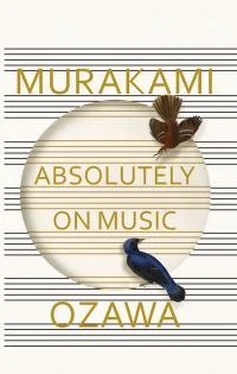MURAKAMI: Just recently, I saw, on NHK, a stage production of Manon Lescaut that you conducted in Vienna in 2005. The one with a modern-day setting.
OZAWA: The director of that was Robert Carsen. Of all the many operas he directed, the most wonderful one was Richard Strauss’s Elektra. It was a tremendously modern setting, but he did a fantastic job. And one other one—Janáček’s Jenufa: it was flawless. He also did Tannhäuser. You know how that’s the story of a song contest: he changed it into a painting contest.
MURAKAMI: You can do stuff like that?
OZAWA: Yes, a picture contest. I conducted that one—at Tokyo Opera Nomori, and again in Paris. The reception in Japan was kind of lukewarm, but the production was very well received in Paris. I guess the French are fond of art.
MURAKAMI: When you put out the money to mount a new opera production, I suppose you can’t make up your expenses unless it’s performed a certain number of times.
OZAWA: In fact, from the theater’s point of view, they’d like to do the same production of a work for ten or twenty years to get their investment back. For example, the Vienna State Opera still has Zeffirelli’s production of La Bohème. That must be going on thirty years by now. At the very least, the theater assumes it will keep a production it’s mounted for three years. If it performs the opera for three years, say, a dozen or so times a year, that’s about forty performances. Then they can recoup their investment. After that, they can make a profit renting the sets out to somewhat lesser opera houses.
MURAKAMI: So theaters can make a profit that way?
OZAWA: That’s right.
MURAKAMI: Some years ago, you conducted Beethoven’s Fidelio in Japan. Were those borrowed sets?
OZAWA: Yes, of course. They were brought over on a ship. But that time was a little different. It was a tour performance of the Vienna State Opera, so the theater didn’t have to rent the sets. Next they’re going to do Tchaikovsky’s The Queen of Spades, and all the sets will be shipped from Vienna.
MURAKAMI: So what you’re saying is that stage sets or the production itself becomes an opera house’s asset?
OZAWA: Correct. In Japan, though, even though we might want to store a stage set, we’ve got no place to put them. In Vienna, there’s a great big storage facility out in the suburbs. The theater got a big piece of property from the government, and they keep all their sets there. They bring them back and forth to the theater by truck. The Vienna opera house can’t hold the equipment for more than two operas at a time, so the trucks are hauling sets back and forth between the theater and the storehouse almost every day.
Booed in Milan
MURAKAMI: I guess it’s safe to say that opera is the very essence of modern European culture. It has always borne the most colorful and brilliant part of European culture on its shoulders, from the age when it was patronized by the royalty and aristocracy through the time when it secured the feverish support of the bourgeoisie, to our own period of corporate sponsorship. Do you think there has been some sense of resistance to the idea of a Japanese conductor invading such territory?
OZAWA: Yes, of course. I was treated to some intense booing when I first appeared at La Scala [in 1980]. I was conducting Tosca with Pavarotti. He and I got along well, so he invited me to come to Milan. He was very eager for us to work together, and I liked him, so I finally took the bait. [ Laughter. ] Maestro Karajan was totally opposed to the idea. “It’s suicide,” he said. “They’ll kill you!”
MURAKAMI: Who would kill you?
OZAWA: The audience. The La Scala audiences are famous for being tough on performers, and, sure enough, they booed me like crazy. I conducted seven performances, but after the first three, I suddenly noticed they weren’t booing me anymore, and the rest went off without a hitch.
MURAKAMI: They do a lot of booing in Europe, don’t they?
OZAWA: A lot—especially in Italy. There’s never any in Japan, though.
MURAKAMI: None at all?
OZAWA: Well, maybe a little, but nothing like the mass howling they do in Italy.
MURAKAMI: I used to see that in the papers all the time when I was living in Italy. Like “Ricciarelli Roundly Booed Last Night in Milan.” I was shocked to see what big news they could make of opera-house booing in Italy.
Ozawa laughs.
MURAKAMI: There seems to be a culture of booing. As a novelist, I’m used to having my books trashed in print, but if I don’t want to see bad reviews, I just don’t have to read them. I don’t have to get angry or depressed. But a musician does his stuff right there in front of an audience, so if they boo him to his face, he can’t run away from it. That must be awfully hard, isn’t it? I always think how tough it would be.
OZAWA: I got booed for the first time in my life when I was conducting those Tosca s at La Scala, and that was exactly the time my mother came all the way from Japan to Milan. Vera couldn’t be there because the kids were still small, so my mother came in her place to cook me Japanese food. She came to the theater for the first performance, and when she heard all the booing around her, she figured they must be yelling “Bravo!” [ Laughter. ] It was so loud, she assumed people must be enjoying the performance. When we got back to the hotel, she said, “Wasn’t that wonderful? There was so much cheering for you!”
MURAKAMI: Ha ha ha.
OZAWA: So I explained to her that they weren’t saying “Bravo!” but “Boo!” She had never heard anything like that in her life, so she just didn’t get it.
MURAKAMI: That reminds me of the time I went to a Red Sox game at Fenway Park, and every time the third baseman Kevin Youkilis came out, the crowd would start yelling “Youuk!” at the top of their lungs. At first, I thought they were booing him, but I couldn’t figure out why. They were “You-ing” him, not booing him.
OZAWA: True, they sound a lot alike! But anyway, when I got booed in Milan, Pavarotti tried to comfort me. “When they boo you here, Seiji, it means you’ve made it into the top ranks of the music world.” And some of the orchestra members told me that no conductor had ever appeared there without being booed. Even Toscanini had been booed at La Scala. But no matter what they said, I didn’t find it comforting at all. [ Laughter. ]
MURAKAMI: Still, it sounds as if everyone was very concerned for you.
OZAWA: My manager, too. “You’ve got nothing to worry about,” he said, “because the members of the orchestra are on your side. That’s the most important thing. If a conductor gets booed and he doesn’t have the support of the orchestra, he’s done. So don’t worry, just put up with it for a little while. I guarantee you it will all go well.” And he was right: I did have the musicians behind me. Sometimes they would even boo right back at the audience. I saw it happen.
MURAKAMI: So it worked out all right?
OZAWA: It did. The booing died out after a few days. It got weaker and weaker, and then one day it was gone. From that point to the end of the run, I had no booing at all. But, boy, if it had gone on to the end, it might have done me in. I’ve never had it that bad, so I really can’t say what I would have done.
MURAKAMI: And you’ve conducted lots of operas at La Scala since then, haven’t you?
OZAWA: Yes, quite a number: Weber’s Oberon, Berlioz’s The Damnation of Faust, Tchaikovsky’s Eugene Onegin and The Queen of Spades, and a bunch of others I can’t remember offhand.
MURAKAMI: And you were never booed after that first time?
Читать дальше











